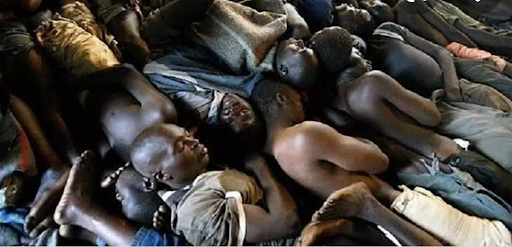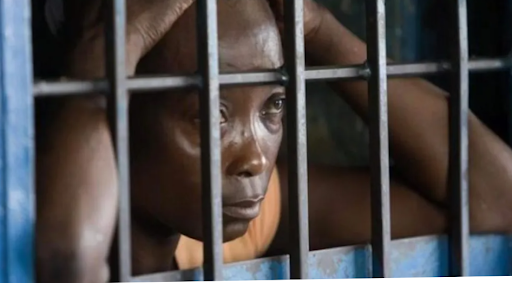Delayed Justice: Factors Causing High Number Of Awaiting Trial Inmates In Nigeria
Overcrowding in Nigeria's correctional centres has become a burden on the country due to poor administration of the justice system.

Robert Kpanou is a Beninese living and working in Nigeria as a tiler. He was arrested on proxy while returning from work on Oct. 24, 2020, four days after the infamous Lekki shooting in Lagos, Southwest Nigeria.
The police accused him of being one of the hoodlums who vandalised properties in the state during the #EndSARS protests. Despite showing the security operatives his working tools, he was driven to Lekki police station.
Days later, he was moved to Area A Command, Lagos Island, known as the Lion Building. Kpanou was arraigned before Yaba Magistrate Court on Nov. 3, 2020 and he has since been remanded in the Kirikiri correctional centre.
His predicament led to the relocation of his wife and two children from Nigeria to Benin Republic as he battles various forms of challenges including beating in prison. He said in his last interview with HumAngle that “to eat in here is a problem. Sometimes we just eat in the morning and that is all for the day. If we are lucky, we can take garri in the morning and beans in the night or you can just go to bed like that without anything.”
His lawyer, Festus Ogun, said his client had only appeared in court twice since his arrest. On his last appearance, the court adjourned his case to Dec. 17, 2021.
Like Kpanou, there are many Nigerians who have spent years in prison without bail nor trial. In fact, some officials have in the past raised concerns over the menace of the increasing number of awaiting-trial inmates being held at correctional facilities.
Six months ago, the Comptroller, Nigerian Correctional Service (NCS) Lagos State Command, Adewale Adebisi, told the press that suspects awaiting trial for up to 12 years are still at Kirikiri.
Scary data
The data from the correctional authority reveals that the country’s facilities have the capacity to hold 50,083 inmates but they currently hold up to 70,056.
Of the 70,056 inmates, 50,822 are awaiting trial, and only 19,234 have been convicted. By these statistics, it means seven out of 10 inmates are serving jail terms without being convicted.

According to the National Bureau of Statistics (NBS) correctional centre statistics data, no fewer than 65 facilities are overcrowded in southwest Nigeria. The data shows that the same situation is obtained in the south-south of the country and sadly, all the facilities in the southeast are overcrowded too. A review by HumAngle shows that the northern parts are relatively lower but at least two inmates are occupying the space intended for one person.
Speaking on the scary data in July, Interior Minister Rauf Aregbesola called on state governments to work with the federal government in addressing the challenges as an overwhelming majority of inmates in custody are state offenders being tried by their respective state governments.
He urged the judiciary to also accelerate the wheel of justice as a lot of inmates had been in custody for a period longer than the maximum sentence their alleged offences carry, saying it is miscarriage of justice.
Factors causing justice delay
Some lawyers and rights activists who spoke to HumAngle said Nigeria Police are the reason most cases are delayed through their illegal arrests and filing of wrong charges to wrong courts. HumAngle also learnt that police interference in purely civil matters also contribute to the menace.
“Police most times arraign suspects of capital punishment, such as murder, armed robbery and rape cases at the magistrate court, which lacks jurisdiction to hear them. The magistrate will then order them to seek the advice of the Department of Public Prosecution (DPP) domiciled in the Ministry of Justice of every state so that the matter would be directly filed at the high court.
“What magistrates do in these kinds of cases is that they will order that suspects be remanded in prison pending the time they will be transferred to the high court by the Police for the suspect’s bail,” Tunji Rahman, a legal practitioner said.
Sources within the DPP, who preferred anonymity because they were not authorised to speak, said there are many cases waiting for their advice and sometimes they have cases of missing files which often make suspects remain in detention for months or years.
One of the sources in Osun State Ministry of Justice who preferred to be addressed simply as Remilekun added that police have a history of deliberately making suspects go to jail if families are not willing to bribe them or there is a case of weak witnesses to support the allegations against suspects.
Nigeria’s police spokesperson, Frank Mba, did not respond to calls and messages seeking his reaction to this.
Stringent bail conditions
HumAngle understands that most times, magistrates give stringent bail conditions for minor offences. Hence, suspects would have no choice but to be remanded in correctional centres while their lawyers fight the battle of ensuring justice.
A 30-year-old Christopher Anyawu was arrested for allegedly stealing foodstuffs from his neighbours in Anambra and was arraigned before a magistrate court in the state early January.
He was granted bail on the same day he was arraigned but it was in the sum of N500,000 with a reliable surety in like sum. He was, therefore, kept in prison for two weeks as his lawyer filed for a motion for variation of bail conditions.
“There are many instances where the conditions magistrates give to suspects are wicked and you will ask yourself if they truly know that a man who stole foodstuffs cannot have N500,000 and still engage in stealing,” a rights activist, Kunle Oyadiran, said.
“Many of those in prisons are casual thieves and those who engage in fighting on the streets. Some of them do not have access to lawyers and the few ones with lawyers get stringent bail conditions. The more they stay in prison, the more police accuse them of additional wrongdoings.”
Prison officials
Taiwo Adedeji shared a filthy cell with prisoners on death row at the Abeokuta prison in Ogun State. He was arrested for armed robbery in the early ’90s and spent over two decades.
He was released on April 9, 2020 when President Muhammadu Buhari granted pardon and clemency to inmates of the Custodial Centres of the Nigeria Correctional Service (NCoS) as part of measures to control the spread of COVID-19.
He said there were days correction officials would not go to court with suspects awaiting trial unless they paid for their transportation.
“If you dare to complain, they will beat you blue-black. They will force you to clear the toilets anytime you offend them. It was a terrible experience and I pray you don’t experience such a thing in your lifetime,” he told HumAngle in an earlier report.
His testimony, according to lawyers who spoke with HumAngle, shed light on how criminal cases are continuously adjourned because suspects and witnesses cannot be brought to hearings for testimony by the prosecutors.
“I have seen cases where presiding judges personally paid for the transportation and hospitality costs of witnesses so that cases could be adjudicated and closed. There are times the court experiences missing files which in many cases you hear that some files have either been lost or stolen. May Nigeria not happen to you,” Oyadiran added.
Implications
Overcrowding occurs in Nigeria’s correctional centres when the number of inmates exceeds the capacity of the facilities. In such situations, prisoners have very little freedom of movement, a development that often causes damage to their physical and mental well-being.
“Prison conditions in Nigeria have accounted for the outbreak of infectious diseases and mental health issues. Proper hygiene is not maintained and good diet is not guaranteed, which later affects healthy living of inmates, research shows.
Aside from the inhumane treatment inmates are subjected to, overcrowded prisons cost a lot of money as Nigeria spends N7.6 billion annually on awaiting trial inmates alone. Data from the prison authority revealed that about N450 is spent daily on each inmate, amounting to N21.3 million daily.
More so, the country has experienced a number of jailbreaks in the last one year leading to the escape of no fewer than 2,051 inmates. The jailbreaks cut across various states in different regions of the country.
Speaking on this, the convener of Centre for Justice Mercy and Reconciliation, a non-governmental organisation that supports ex-prisoners, Hezekiah Olujobi said “there will always be jailbreak in as much as people are not treated well in prison. There is a need to separate hardened criminals from heinous ones and refusal to do so may lead to violence. Again, most prisons are dilapidated and weak. This means jailbreaks can easily occur.”
As part of efforts to address this menace, Interior Minister Rauf Aregbesola said the government is working on building 3000-capacity custodial centres in each geo-political zone of the country.
Solutions
Security experts, lawyers and rights activists told HumAngle that there is a need for reform of the criminal justice system starting from the police to correctional centres. They argued that reform is not about change of nomenclature from Nigerian Prison Service to Nigerian Correctional Centres.
“The Nigerian prisons have not changed from hellish dungeons. There is a need to build more prisons to avoid congestion and its effects. The country must make the criminal justice system efficient by first stopping arbitrary arrests and violations of human rights by law enforcement agents,” Hezekiah added.
Legal experts also advocated for prompt legal aid to represent non-privileged detainees, who cannot afford lawyers in court in order to help reduce congestion in prisons.
In addition, plea bargain sensitisation sessions, according to lawyers, would, among others, help to decongest correctional centres and lower crime rate. They also argued for the expansion of the magistrate courts power to try some cases.
“If this is allowed by law, trial commences immediately after arraignment and bails can be granted, rather than making orders to remand,” Oyediran noted.
Support Our Journalism
There are millions of ordinary people affected by conflict in Africa whose stories are missing in the mainstream media. HumAngle is determined to tell those challenging and under-reported stories, hoping that the people impacted by these conflicts will find the safety and security they deserve.
To ensure that we continue to provide public service coverage, we have a small favour to ask you. We want you to be part of our journalistic endeavour by contributing a token to us.
Your donation will further promote a robust, free, and independent media.
Donate HereStay Closer To The Stories That Matter




